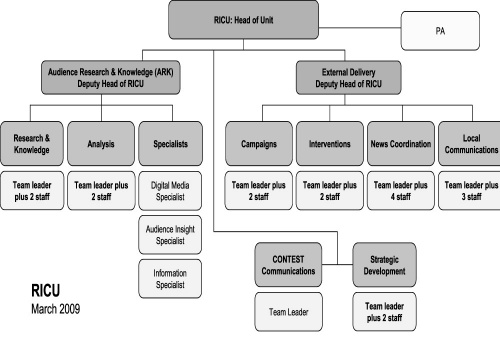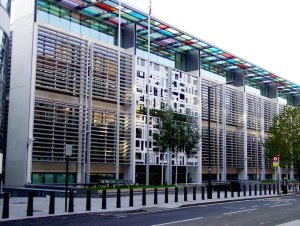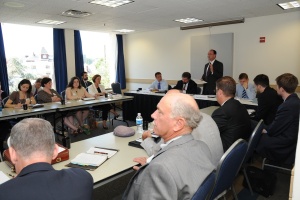Difference between revisions of "Research, Information and Communications Unit"
| Line 1: | Line 1: | ||
| − | The [[Research, Information and Communications Unit]] ([[RICU]]) is a strategic communications unit within the UK's [[Office for Security and Counter-Terrorism]]. Based in the [[Home Office]] it is also funded by and answerable to the [[Foreign Office]] and the [[Department | + | The [[Research, Information and Communications Unit]] ([[RICU]]) is a strategic communications unit within the UK's [[Office for Security and Counter-Terrorism]]. Based in the [[Home Office]] it is also funded by and answerable to the [[Foreign Office]] and the [[Department for Communities and Local Government]]. |
==Creation and purpose== | ==Creation and purpose== | ||
Revision as of 09:59, 18 October 2009
The Research, Information and Communications Unit (RICU) is a strategic communications unit within the UK's Office for Security and Counter-Terrorism. Based in the Home Office it is also funded by and answerable to the Foreign Office and the Department for Communities and Local Government.
Contents
Creation and purpose
The Sunday Times reported in December 2007 that:
- The alleged airline plot in August 2006 caused another of the government’s periodic rethinks. For all the work on pursuing terrorists, the government realised that its strategy on preventing more taking their place was not working. After a bureaucratic tussle, the Home Office has become the centre for a new strategic hub for all counterterrorism policy: the Office of Security and Counter Terrorism.
- The rethink also led to the creation of the nebulously titled Research, Information and Communications Unit (RICU). Officials deny this is in any way a propaganda department, although one conceded: “It does sound horribly cold war.”
- Its task is to analyse the way in which key audiences at home and abroad (in other words, Muslims) react to messages from the government and to try to give more coherence to those messages to undermine the ideology of Al-Qaeda. In the counterterrorist jargon of the day, its job is to build and promote a counter-narrative to the single narrative that Al-Qaeda and its allies propagate. “You can do it without it looking like government propaganda, because if it looks too much like government propaganda then I don’t think people are going to listen, nor should they,” argues Mottram.[1]
Location of RICU
The RICU is part of the The Home Office.[2]
The Home Office is located at 2 Marsham Street, London, SW1P 4DF
Size and staffing
According to the Home Office, the total numbers of staff in RICU was as follows:
- June 2007- 3
- Sept 2007- 8
- Dec 2007- 10
- Mar 2008- 12
- Jun 2008- 17
- Sept 2008- 28
- Dec 2008- 33 (including secondees).[3]
Budget
Home Office figures on the cost of RICU are as follows.[4]
2008/2009 Budget
Programme Budget
- Total: £2,172,610
- Home Office contribution: £660,000
- Foreign and Commonwealth Office contribution: £810,073
- Department of Communities and Local Government contribution: £702,537
Administration Budget
- Pay: £806,138
- Non-Pay: £153,167
2009/2010 Proposed Budget
Programme Budget
- Total: £5,700,000
- Home Office contribution: £1,200,000
- Foreign Commonwealth Office contribution: £3,000,000
- Department of Communities and Local Government contribution: £1,500,000
Administration Budget
- Pay: £867,000
- Non-Pay: £154,000
Structure
As of March 2009, the RICU consists of the Head of Unit and his Personal Assistant. The Head of Unit oversees two branches. Both of the branches has a Deputy Head and separate teams.[5]

Audience Research & Knowledge (ARK) Branch
This branch includes five teams.
- Research and Knowledge: team leader and 2 staff
- Analysis: team leader and 2 staff
- CONTEST communications: team leader
- Strategic Development: team leader plus 2 staff
- Specialists: Digital Media Specialist, Audience Insight Specialist, Information Specialist
External Delivery Branch
This branch includes four teams.
- Campaigns: team leader and 2 staff
- Interventions: team leader and 2 staff
- News Coordination: team leader and 4 staff
- Local Communications: team leader and 3 staff
All of the above information was provided by the Home Office.[7]
Activities
Language of Counter-Terrorism
The RICU demands civil servants not to use phrases such as "Islamist extremism" and "jihadi-fundamentalist." This is due to the fact that the organization wishes to thwart any ideas of a fundamental connection between islamic beliefs and terrorism. Civil servants are required to refer to terrorism and terrorist groups as "violent extremism," "criminal murderers," and "thugs."
Conference presentations
On June 24, 2008, Jonathan Allen (head of RICU) was featured at a panel discussion called "Words Matter: The Role of Lexicon in Counter-Terrorism Communications Strategy." The discussion was hosted by the Homeland Security Policy Institute. The other featured speakers were Daniel Sutherland (Officer for Civil Rights and Civil Liberties at the US Department of Homeland Security), and Jeffrey Imm, (research director for the Counterterrorism Blog and former analyst with the FBI).
On Tuesday, 7 October 2008 at 15:00, Jonathan Allen, Head of the RICU, spoke at a conference called "Public Diplomacy: Meeting New Challenges" held at Wilton Park in West Sussex. He spoke during a section of the conference called, "How to Change Public Behavior: A Foreign Policy Context." His fellow speakers during this section of the conference included Klavs Holm (Under Secretary, Ambassador, Ministry of Foreign Affairs, Copenhagen), and David Kenning (Chief Strategist, Bell Pottinger Sans Frontieres, London).
RICU discussed with Pakistan government
November 2008, Home Secretary Jacqui Smith met with Pakistan's Information and Broadcasting minister Sherry Rehman at the House of Commons to discuss bilateral issues and combating terrorism. Smith said that military force alone will not stamp out terrorism. Smith discussed the British counter-terrorism strategy, which is the RICU, with Rehman. Smith said that the RICU "...plans advances and amplifies the objectives in today's crowded mobile world." She then said that Rehman has Britain's support in creating and implementing a similar organization in Pakistan. Rehman discussed Pakistan's problem with terrorism using the assassination of Mohtarma Benazir Bhutto as an example.
Projects Undertaken
According to the Home Office, the following are the projects that have been undertaken by the RICU since its formation:[8]
- Youth Segementation: A project that looked at how young British Muslims felt about their identity and sense of belonging. Completed. Period of Research - Early 2008, Research company contracted Define Research.
- Online Behaviours: A project that studied how young British Muslims use the internet. Project has been completed. Period of Research - March-April 2008, Research company contracted Connect Research.
- Media Consumption: A project that looked at media consumption among British Muslims. Project has been completed. Period of Research - Early 2008, Research company contracted TNS
- Counter-Terrorism Message Testing: A study researching how Government messages are perceived by Muslim communities. Project has been completed. Period of Research - Mid 2007 - Early 2008, Research company contracted Turnstone
- Estimating Network Size and Tracking Information Dissemination Amongst Islamic Blogs: A study that researched the size of blog readership. Project has been completed. Period of Research - Early 2008, Research company contracted 'Academic at University of Nottingham'.
- The Language of Terrorism: A project that studied public discourse of counter-terrorism themes. Project has been completed. Period of Research - January 2007 - March 2008, Research company contracted TNS
- Credible Voices: A project that studies why some voices are more credible than others to Muslim communities. Project is currently underway.
- Audience Insight Qualitative Phase I: A project that looked at understandings of 'Britishness' and terrorism and where these feelings come from within the British population. Project has been completed.
- Audience Insight Quanititative Phase II Segmentation: A survey of attitudes, behaviours and general demographics of the British population. Project is currently underway.
- Audience Insight Quantitative/Qualitative Phase III Evaluation (Pilot): A qualitative and quantitative study of shifting attitudes across the population. Project is currently underway.
People
The RICU was created as a result of the advice of Dr. J. P. Macintosh, who is currently the head of the Advanced Research and Assessment Group (ARAG) for the Defence Academy of the United Kingdom. "He catalysed the use of a "war room" facility to begin building the capacity needed to transform the Home Office. His advice was "instrumental in the creation of the Office of Security and Counter Terrorism (OSCT) and the Research Information & Communication Unit (RICU)."[9]
Staff
- Jonathan Allen: Head of Research, Information and Communications Unit | Andrew Garner | Paul Mott 'Counter Terrorism communications' - attended the 2008 Newsxchange conference on behalf of RICU[10] | Michael Nevin[11] | Stephen Rimmer (director of Prevent and RICU circa February 2008 - February 2009[12] | Paul Smith (seconded from ACPO) |
Journalists in touch with RICU
- Frank Gardner BBC Security Correspondent
Others in contact
- David Stevens - University of Nottingham - undertook a placement at RICU from November 2007-Mar 2008
Resources, Publications, Contact
Resources
- http://www.homeoffice.gov.uk/about-us/freedom-of-information/released-information/foi-archive-crime/1352-government-anti-terrorist?view=Html
- http://www.esrcsocietytoday.ac.uk/ESRCInfoCentre/ViewAwardPage.aspx?ts=2&data=z8HSvl3fWwVY2sDo4JNP8iOLJQdQnq85MsSF4JQ2cVHRt6Z80eapox%2Fh0w35tsA8Z2n1ly0T8vM7xXdhNkbQrgQxDMr5xj13O34dr3%2BZd1Q%3D
- http://www.fromthefrontline.co.uk/blogs/index.php?blog=18&title=title_70&more=1&c=1&tb=1&pb=1
- http://www.esrcsocietytoday.ac.uk/ESRCInfoCentre/opportunities/current_funding_opportunities/pfs_ricu07.aspx?ComponentId=24171&SourcePageId=13306
- http://www.homeoffice.gov.uk/about-us/freedom-of-information/released-information/foi-archive-crime/1352-government-anti-terrorist?view=Html
- http://www.dailymail.co.uk/news/article-1084977/Confusing-PC-language-hampering-anti-terror-fight-government-watchdog-says.html?ITO=1490
- http://www.guardian.co.uk/world/2008/aug/26/alqaida.terrorism
- http://www.guardian.co.uk/media/2008/aug/28/bbc.pressandpublishing
- http://www.fco.gov.uk/resources/en/word/5029385/5029509/5029751/ricu-info-for-candidates
- http://www.theyworkforyou.com/wrans/?id=2007-12-11e.172384.h
- http://security.homeoffice.gov.uk/about-us/RICU/
- http://ukinsouthafrica.fco.gov.uk/en/newsroom/?view=News&id=8985566
- http://www.communities.gov.uk/news/corporate/1055379
- http://www.communities.gov.uk/documents/communities/pdf/1098129.pdf
- http://www.thesargeants.net/dblog/articolo.asp?articolo=168
- http://www.gwumc.edu/hspi/lexiconsummary.htm
- http://www.wiltonpark.org.uk/documents/conferences/WP902/pdfs/WP902prog.pdf
- http://discussions.bbcamerica.com/jiveforums/thread.jspa?messageID=62853
- http://www.unitedstatesaction.com/blog/imm-articles/101.html#T01
- http://www.unitedstatesaction.com/blog/imm-articles/101.html#T02
- http://www.buckscc.gov.uk/moderngov/Published/C00000127/M00002795/AI00004223/$CCEFPreventBriefing.docA.ps.pdf
Publications
- CounterTerrorism Communications Guidance: Communicating Effectively with Community Audiences (RICU/12/07), September 2007[13]
Contact
http://security.homeoffice.gov.uk/about-us/RICU/
Notes
- ↑ Gordon Corera Don’t look now, Britain’s real spooks are right behind you The Sunday Times December 2, 2007
- ↑ The Home Office (2009) Freedom of Information Response. (email correspondence from J. Fanshaw to D. Miller) 20, April 2009. Received 20, April 2009. 09:30
- ↑ The Home Office (2009) Freedom of Information Response. (email correspondence from J. Fanshaw to D. Miller) 20, April 2009. Received 20, April 2009. 09:30
- ↑ The Home Office (2009) Freedom of Information Response. (email correspondence from J. Fanshaw to D. Miller) 20, April 2009. Received 20, April 2009. 09:30
- ↑ The Home Office (2009) Freedom of Information Response. (email correspondence from J. Fanshaw to D. Miller) 20, April 2009. Received 20, April 2009. 09:30
- ↑ The Home Office (2009) Freedom of Information Response. (email correspondence from J. Fanshaw to D. Miller) 20, April 2009. Received 20, April 2009. 09:30
- ↑ The Home Office (2009) Freedom of Information Response. (email correspondence from J. Fanshaw to D. Miller) 20, April 2009. Received 20, April 2009. 09:30
- ↑ Data on topics and whther project completed from The Home Office (2009) Freedom of Information Response. (email correspondence from R. Stokes to D. Miller) 8, April 2009. Received 20, April 2009 16:51; data on period of research and name of company undertaking research from J Fanshaw, Direct Communications Unit, Home Office 'Freedom of Information response - Ref 11707, Annex A Details of RICU Research', 27 May 2009, 10.08
- ↑ Defence Academy Dr. J. P Macintosh, accessed 6 May 2009
- ↑ Newsxchange 08 Delegate List 2008, accessed 20 April 2009
- ↑ Jim Armstrong, Candace J. Chin, Uri Leventer The Language of Counter-Terrorism: When Message Received is Not Message Intended Harvard Kennedy School Policy Analysis Exercise, Prepared for the United Kingdom Foreign and Commonwealth Office, British Consulate-General, New England, April 2008: Acknowledgements
- ↑ Stephen Rimmer Allegations made in the Panorama programme 'Muslim First - British Second' on Monday 16 February, 17 February 2009, accessed 1 April 2009
- ↑ cited in Home Office Part 2 of the government's Prevent Strategy, Objective 5: Addressing Grievances, published 3 June 2008, p.44. accessed 7 February 2009

